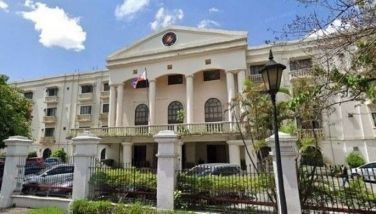Zubiri: No conflict of interest in pushing for Biofuels Act
MANILA, Philippines – Sen. Juan Miguel Zubiri yesterday maintained that he could not be held liable for conflict of interest in pushing for the Biofuels Act while he was Bukidnon representative.
Zubiri said his family was no longer into sugar cane production and that they had given out their lands under the Comprehensive Agrarian Reform Program (CARP), contrary to the report of Vera Files on what he stands to gain from the budding biofuels industry.
Zubiri’s statement came as Vera Files also maintained yesterday that their story titled “Iggy to use biofuels law to evade CARP” written by Jessica Hermosa and Johanna Sisante, is factual and accurate.
In a press conference, Zubiri branded the Vera Files report as malicious, saying those who interviewed him introduced themselves as University of the Philippines students doing research on biofuels.
“I don’t know why this supposed research was passed on as investigative report. I really think they have an agenda,” Zubiri said.
He said he had explained many times before that his bill, which became Republic Act 9367 or the Biofuels Act and earned him the moniker “Mr. Biofuel,” was not meant to protect or promote his family’s business.
“How could we when all our lands have been voluntarily given to the CARP and whatever land left to us allowed under the law, we have leased to the Department of Labor and Employment for banana production for the last four years. Definitely, this was before the law was approved in 2006 so there is no conflict of interest,” Zubiri said.
“If the authors did any serious investigating and visited the area, they will see the obvious that it’s all planted with bananas and that the provincial assessor has not updated their records. My remaining eight hectares of land cannot be classified as a plantation but a modest farm. What saddens me most is that our family, who had complied with the CARP law since 1988 and supported its turnover to farmer beneficiaries, was one of the first to do so, and yet the story pictures our family as sugar barons. It is a blatant lie,” Zubiri said.
“Even the insinuation that my father has some control over Busco or Bukidnon Sugar-milling Company is completely false. All ties to that company have been severed since 1988. Since then, it has been owned by Filipino-Chinese businessmen and whatever transaction they do either on sugar or ethanol is their business and we have nothing to do with it,” Zubiri said.
“Let me put on record that there is no provision in the Biofuels Act that would violate or shortcut the CARP. I wish that the authors of the story had read the law which would show nothing on land conversion and exemptions from CARP. On the contrary, it is the CARP beneficiaries tilling three hectares of sugar land that will benefit from the higher value and pricing of their sugar crops for biofuels,” he said.
He expressed frustration that instead of allowing the law to be implemented, many had become “fault-finders.”
He insisted that if implemented properly, biofuels would not compete with food since the feedstock to be used would be sugarcane of which the country has an oversupply. He said the excess production were for export at super low prices.
“We have enough excess sugar to supply the 10 percent ethanol requirement of the law while jatropha can be planted in close to four million hectares of cogonal mountain land that remain idle,” he explained.
“The worst part of all is that we have not even implemented the biofuels program and we have an impending food crisis. A double whammy – we have no food or fuel independence and yet we like to find fault on the solutions proposed to counter these problems,” Zubiri said.
Lawmakers guilty of conflict of interest in the bills they push for passage can be held liable under the Anti-Graft Law aside from possible administrative sanctions.
Meantime, Vera Files also maintained yesterday that the biofuels law will protect the sugar land of the family of Negros Occidental Rep. Jose Ignacio “Iggy” Arroyo from CARP in the midst of the lawmaker’s denial of the report.
Vera Files reiterated that the Biofuels Act of 2006 which Rep. Iggy Arroyo co-authored effectively creates a demand for ethanol.
Documents from the Department of Agrarian Reform (DAR) showed that the construction of an ethanol plant on Hacienda Bacan was in line with its conversion from agricultural to industrial, according to Vera Files.
“As stated in the story, ‘Reclassifying and converting Hacienda Bacan to agro-industrial land will exempt it from CARP distribution because RA 6657 or the Comprehensive Agrarian Reform Law only provides for the distribution of agricultural land not classified as industrial land,’” Vera Files said.
Vera Files also said that this was confirmed by agrarian reform lawyer and former DAR undersecretary Gil de los Reyes, whom the reporters consulted regarding CARP.
Hermosa and Sisante also reiterated that they contacted Rep. Arroyo’s office several times regarding Hacienda Bacan through telephone, mobile phone, and e-mail from March 4 to March 17, 2008 to get the congressman’s side on the issue.
The correspondence, Vera Files said, ended when Arroyo’s political affairs officer, Paolo Balmores, indicated through SMS that their chief-of-staff said that the reporters’ questions about Hacienda Bacan were not relevant to the house bill.
The copies of the e-mails and text messages are still with the reporters, according to Vera Files.
National peasant organization Task Force Mapalad (TFM) also challenged Rep. Arroyo to be true to his word that the CARP could still cover the clan-owned sugar plantations in the province.
In a statement, TFM said the congressman should allow the distribution of Hacienda Bacan to farmer-beneficiaries since the land has been petitioned for CARP coverage since 2000.
“He should make good his word that the Arroyo-owned sugar plantations in Negros Occidental can be covered by CARP. In that case, he should allow the (DAR) to distribute the hacienda to 67 petitioners who had been fighting for its distribution since 2000,” said TFM president Jose Rodito Angeles.
Angeles explained that under the law, agricultural land being petitioned for distribution under CARP cannot be converted into other uses.
Angeles claimed that Hacienda Bacan was already placed under CARP coverage in 2000 through compulsory acquisition. – With Katherine Adraneda
- Latest
- Trending































